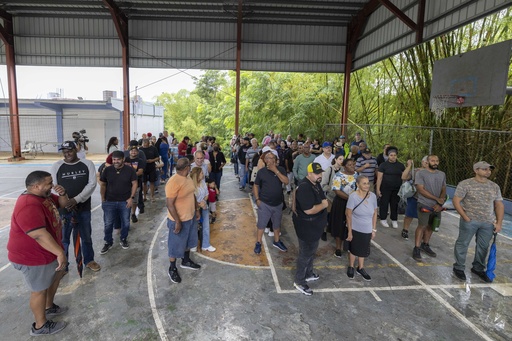
SAN JUAN, Puerto Rico — In a significant development during the gubernatorial election, Jenniffer González of the pro-statehood New Progressive Party was ahead in the polls early Wednesday, potentially steering her party towards a historic third consecutive term—the first time this has happened in Puerto Rican history.
With 91% of precincts reporting, González secured 39%, totaling approximately 438,183 votes, as per the information from the local State Elections Commission.
Following closely behind was Juan Dalmau, representing the Puerto Rico Independence Party and Citizen Victory Movement, who garnered 33%, making up around 364,145 votes. This achievement is notable as Dalmau is the first candidate not affiliated with Puerto Rico’s primary political parties to finish in second place in a general election.
At a press conference early Wednesday, Jessica Padilla, the commission’s alternate president, noted that no official winner had been declared, emphasizing that “votes are still in the process of being counted.”
While González has proclaimed victory, Dalmau has stated that his party will await the completion of the vote tally. “This is the beginning of a glorious transformation of our country,” he expressed late Tuesday, acknowledging the historic significance of the moment.
The Popular Democratic Party, which advocates for the island’s status as a U.S. territory, faced a decline, placing third with Jesús Manuel Ortiz obtaining 21% or 233,470 votes. Javier Jiménez of the Project Dignity party received 7% of the votes.
The eventual victor will take over from Governor Pedro Pierluisi, who was defeated by González in a surprising primary election held in June within the New Progressive Party.
In the race for a new representative for Puerto Rico in the U.S. Congress, Pablo José Hernández from the Popular Democratic Party was maintaining a lead with 46% of the vote compared to 35% for William Villafañe from the pro-statehood party, reveling in the partial results.
Dalmau’s notable performance reflects an increasing trend among voters who are moving away from the traditional political parties that have dominated the island for years.
There is a growing sentiment among both young and older voters regarding dissatisfaction over ongoing issues such as corruption, persistent power outages, and a shortage of affordable housing. Many are now eager to explore new leadership options.
Voter Aisha Rodríguez Díaz, 37, shared her optimism about the election outcome, stating that it showed promise for third-party candidates. “They’ve already made history,” she said, highlighting the coalition formed by the Independence Party and the Citizen Victory Movement.
Additionally, voters addressed a seventh nonbinding referendum concerning Puerto Rico’s political status, presenting three possible options: statehood, independence, and independence with free association.
Statehood received a majority of 57% of the votes, followed by independence at 31%, marking the latter’s first ascent to second place. Interestingly, over 165,000 ballots were left blank.
Regardless of this referendum’s result, any alteration in Puerto Rico’s political status requires approval from the U.S. Congress. Party officials have long contended that Puerto Rico experiences inequitable treatment by the federal government, especially concerning Medicaid, Medicare, and other essential programs.
